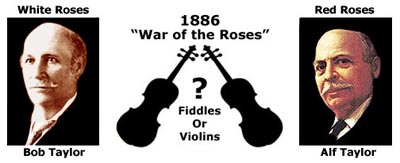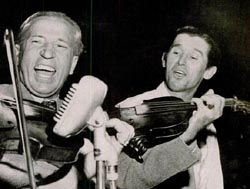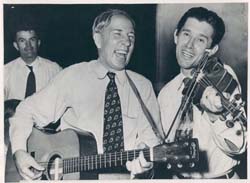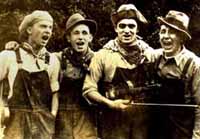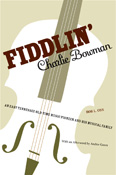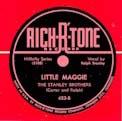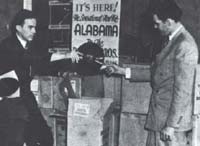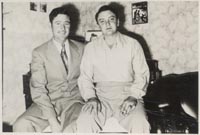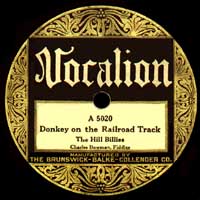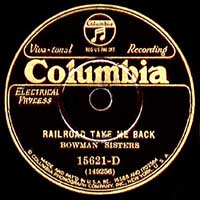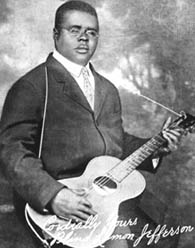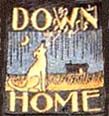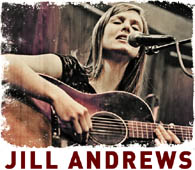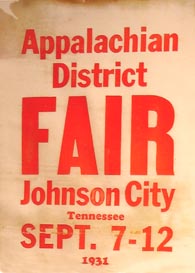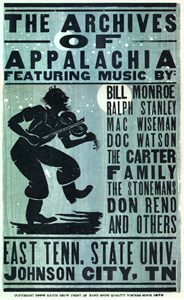Rummaging around Johnson's Depot for archived stories, one of the most surprising revelations to surface was the City's old-time music heritage. Along with several other Appalachian towns, notably Bristol and Asheville, Johnson City was a haven for early recording artists including the legendary Jimmie Rodgers and Blind Lemon Jefferson.
For well over a century, the Northeast Tennessee region has truly been blessed with a profusion of high-quality old-time musicians. The mere mention of “old-time music” conjures up images of a string band, casually dressed in characteristic mountain attire, playing distinctive deep-south non-amplified toe-tapping dance music on their well-worn and sometimes hand-me-down instruments. This simple phrase evokes such language as “Appalachian style,” “authentic,” “acoustical,” “old fashioned,” “grass roots,” “hillbilly,” “pre-bluegrass”and “rural American.”
In tandem with the railroad glory years in Johnson City, several local musicians became quite famous in a genre that is now recognized as the origin of country music. The story of "Fiddlin" Charlie Bowman and his family is fascinating as these gifted musicians merged railroad songs and simulated train sounds into their repertoire and appeared on some of the earliest country music recordings in the U.S.
Charlie was known as “the champion fiddler of East Tennessee,” so named for winning more than two-dozen fiddle contests. His future credentials would include being a 2001 inductee into the North American Fiddler’s Hall of Fame. He was a major recording artist, vaudeville performer, songwriter, and a member of several musical groups, including Al Hopkins and His Buckle Busters (the Hill Billies). Charlie had a talent for generating atypical sounds from his fiddle, ranging from a couple of hound dogs chasing a red fox through the Tennessee hills to a barnyard selection with cacklings from a gobbler and a bantam hen. He could play fifteen standard and several not-so-conventional instruments: brooms, saws, washtubs, thick balloons, a homemade one-string bass, and even an underfeed furnace. In 2006, a major discovery was made of the "Lost Suitcase Collection," a previously unknown cache of photos, tour memorabilia, and news stories on Charlie and the Bowman family of touring musicians.
Fiddle music and railroads played a major role
in Charlie Bowman’s family; both his father, Samuel Bowman, and
grandfather, James Bowman, were old-time fiddlers. His father
worked as a section hand on the East Tennessee, Virginia, and Georgia
Railroad just after the Civil War. Once while serving as a brakeman, he
almost lost his life while switching cars. As a young man, Charlie regularly
assisted his father with odd jobs on the railroad, affording him the opportunity
to become acquainted with several area railroad families. His knowledge
of and appreciation for this unique and important profession is evidenced
in six songs he wrote and performed.
A historical marker near I-26 at the Gray (SR-75) Interchange (near the
Bowman family home) recognizes Charlie, the author of "Nine
Pound Hammer," a classic bluegrass arrangement performed
nightly by bluegrass musicians today almost a century after Charlie invented
this masterpiece. Only recently have these musical pioneers been given
their due as the "Birthplace of Country Music" was not Nashville
but in Northeast Tennessee
and Southwest Virginia.
Old-Time Music and Politics One of the most unusual political campaigns
ever to transpire in the United States was the now-famous
1886 Tennessee governor’s race, known as “The
War of the Roses,” between well-known local politicians
and fiddle-playing brothers, Robert L. (Bob) and Alfred
(Alf) Taylor. The “Rose War” got its name
from the fact that the supporters of Bob, the Democratic challenger,
wore the white rose of York on their lapels, while the followers
of Alf, the Republican contender, adorned the red rose of Lancaster.”
See Frank Leslie's Illustrated Newspaper
cover from 1886. Both Taylor brothers contended in their stump
speeches that: "After this election is over, I will still
be his brother and he will be mine, but I will be the Governor
of Tennessee." |
||||||||||
|
Bob, following his second term as governor, began traveling the national lecture circuit with his very popular discourse, "The Fiddle and the Bow." The Johnson City Comet in 1891 ran this advertisement for Bob Taylor's lecture in Johnson City which was the first pubic rendition of his famous lecture. Read the Johnson City Comet Review of the lecture held on December 29, 1891 at Jobe's Opera House. |
||||||||||
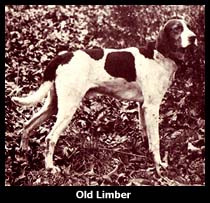 |
||||||||||
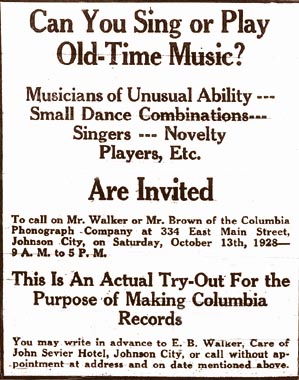
|
||||||||||
Where were the old-time music venues in Johnson City? Would you believe Fountain Square, home of the current Blue Plum Arts and Music Festival, held a weekly open air music fest? In the 1920s, an outdoor event frequently occurred on Saturday nights along the east side of Fountain Square (opposite the railroad tracks). After the merchants closed and locked their stores on Saturday nights, the locals would begin filtering in from miles around to play their music, drawing huge crowds of appreciative spectators. Fitting the mold of modern day jam sessions, these musicians spanned the talent range from the most experienced celebrities such as the Bowman family to the least skilled aspirants, all equally welcomed to participate. Other venues included the Deluxe (later Tennessee Theatre), the Johnson City Municipal Building Auditorium, and of course the Appalachian Fair. Street musicians performed daily including the legendary blues guitarist, Blind Lemon Jefferson, who lived for a period of time in Johnson City playing music for tips on street corners in the early 1920s. In a 1978 interview, North Carolina musician Walter Davis credited the blues influence and guitar ability of Davis and Clarence Greene (performer of Johnson City Blues) to watching Blind Lemon Jefferson perform on the streets of Johnson City.
On October 13, 1928, the Brading-Marshall Lumber Company’s business office at 334 East Main Street became the scene of a myriad of local musicians, each auditioning for a potential record contract with Columbia Records. A slender middle-aged man, with a straggly beard, listened intently as each individual or group played music, in hopes of being invited back that same week for a recording session in their rented temporary makeshift studio.
Frank B. Walker, head of Columbia Records’
“hillbilly” recordings’ division, was known by Johnson
Citians simply as “Uncle Fuzz”. He acquired his unusual nickname
from having always grown a beard before making such audition trips, perhaps
believing that he could better relate with the people he was recording.
Walker had learned from Ralph Peer of Okeh Records (later switching to
Victor Records) that the best way to capture the true inherent nature
of these musicians was to record them in their natural environments. Historians
would later tag his pioneering efforts as the “Johnson City Sessions.”
Walker returned in October 1929 for another round of outstanding recordings for Columbia. Stars of these sessions included Charlie Bowman, Clarence Greene, the Roane County Ramblers and Clarence "Tom" Ashley. Meanwhile over at 207 West Pine Street, Virgil O'Dell hand crafted bluegrass fiddles in his shop, which still exists today (see photos below of a hand-crafted O'Dell fiddle).
In the 1940s, Hobe Stanton of Johnson City pioneered some of the
earliest recordings of what today are recognized as "bluegrass"
recordings. Jim Hobart (Hobe) Stanton was a distributor who installed
records in local jukeboxes in 1946. His ear for music and knowledge of
local tastes helped him earn more by producing records himself. Much as
Victor Records’ Ralph Peer had done in 1927-1928, Stanton sought
local talent, finding as much as he needed. His initial investment was
minimal. Performers were eager to record, and regional radio stations
had studios and equipment available for making master recordings on acetate
discs (tape mastering was still a few years in the future). Prominent
among those stations was WOPI in Bristol, Va., where the Stanley
Brothers (Carter and Ralph) and others recorded. Wilma Lee and Stoney Cooper recorded
at WWNC (Asheville, N. C.) and WWVA (Wheeling, W.Va).
Masters were processed and records were pressed at Palda Records in Philadelphia, another independent producer. Payment to artists was minimal. Most were glad simply to be on records, and a few even paid Stanton for the privilege. Several addresses for Rich-R’-Tone appeared in contemporary trade journals: Rich-R’-Tone Record Co., 113 W. Main Street, Johnson City, Tennessee (January 1949); Rich-R’-Tone and Acme Record Record Co., Inc., Campbellsville, Ky., (August 1952); Rich-R’-Tone Record Co., 407 W. Main St., Morristown, Tenn., (December 1953).
Johnson City appears on record labels
through part of 1950, the year when the operation was moved briefly to
Campbellsville. Labels of 1950-1951 could indicate either city, and suggest
a degree of financial instability. The move to Morristown may have occurred
after record production stopped in 1952 or 1953. Final dates aren’t
clear—Rich-R’-Tone expired gradually, but the label has been
revived and is active today in Nashville.
Bluegrass and traditional music lives on in Johnson City with
the Down Home - the Eclectic Music
Room, where you could have
seen the earliest concerts of Alison Krauss a few years back. The Down
Home is legendary to today's era of bluegrass artists as one of the finest
acoustic settings in the nation, and it reckons back to the era of Charlie
Bowman for artists that may provide great music with or without immediate
commercial success. Not to be outdone, East Tennessee State University
has an accredited program in Bluegrass
and Country Music and graduates of this program
have experienced
significant commercial success.
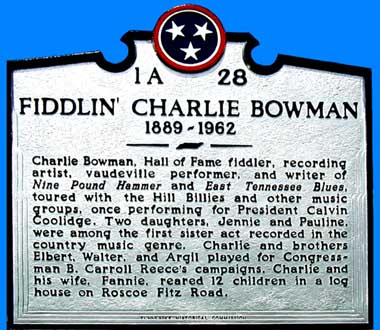 |
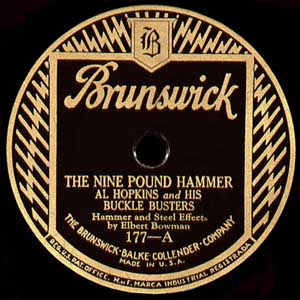 |
||||
| Historical Marker near I-26
- SR 75 Exit at Gray, Tennessee Charlie Bowman Day Proclamation |
Authored by Charlie Bowman |
||||
Washington D. C. February 2, 1926, The Washington Times --- Fiddlin' Charlie Bowman, champion old-time fiddler of most of the territory between the Blue Ridge Mountains and the Mississippi River, is to volunteer his expert advice and management to the old-time fiddler's contest radio station WRC will stage next Tuesday evening. Charlie Bowman is the bright particular fiddling star of the now famous Hill Billies of Tennessee - the itinerant group of young men who have been singing and fiddling and "guitaring" their way to fame in this section of the country during the past few months. Some months ago when Tennessee was much on the front pages and Tennessee doings were causing rifts in friendships as well as discussions among the learned and the eloquent throughout the world, attention was called to the fact that the nearest thing of a simon-pure American was the typical Tennessean of the mountain district. (Reference to the
Scopes Trial in Dayton, TN) And Fiddlin' Charlie is all of that! Straight as an arrow, just a bit more than 30 years of age, and the father of eight children, his whole family history is written in the rocks and trails and roadways around Johnson City, Tennessee. For as long as he can remember, or the family have a history, the Bowmans have lived within a radius of less than fifty miles of the place where "Fiddlin' Charlie" has his own old-fashioned house. It is old-fashioned only in so far as it is a log house, because it has a lot of modern conveniences - brought into it by the bow of its master, who plies his trade as a painter and tills his garden when he isn't off somewhere, winning fiddling contests of playing for dances. The contest takes place - so far as the date is now set - next Tuesday evening. The tentative rules for the contest, so far as the suggestions of Charlie Bowman go, are very simple: The identity of each fiddler will be made known to the radio audience by number. Each fiddler may have an accompanist if he so desires and can provide. The accompanist may play the piano, banjo, guitar, mouth-organ, or any musical instrument. Each fiddler pays his own expenses. |
|||||
|
|||||
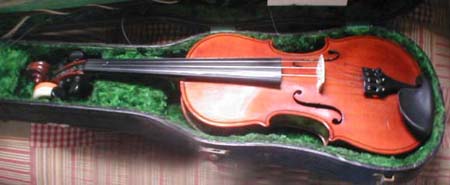 |
 |
|---|---|
Custom Crafted in 1934 by Johnson City Fiddle Maker Virgil O'Dell |
O'Dell Fiddle (Second View) |
| "Favorite
Railroad Songs" as Voted by Henry Johnson Associates Calendar Year to Date |
||
1 |
Wagon Wheel ------- Link to Video | Old Crow Medicine Show |
2 |
Railroad Earth | Railroad Earth |
| 3 |
Nine Pound Hammer | Al Hopkins and His Buckle Busters |
4 |
Johnson City Blues | Clarence Greene |
5 |
Southern Streamline | John Fogerty |
6 |
Life is Like a Mountain Railroad | Amazing Rhythm Aces |
7 |
Canadian Railroad Trilogy | Gordon Lightfoot |
8 |
Orange Blossom Special | Johnny Cash |
9 |
Cripple Creek* | Leo Kottke |
10 |
Freight Train | Peter, Paul, and Mary |
11 |
Wabash Cannonball | Roy Acuff with Dizzy Dean |
*A train song if you listen carefully.
|
|||||||||||||||||||||||||||||||||||||||||||||
|
|||||||||||||||||||||||||||||||||||||||||||||
|
Links
|
|||||||||||||||||||||||||||||||||||||||||||||
